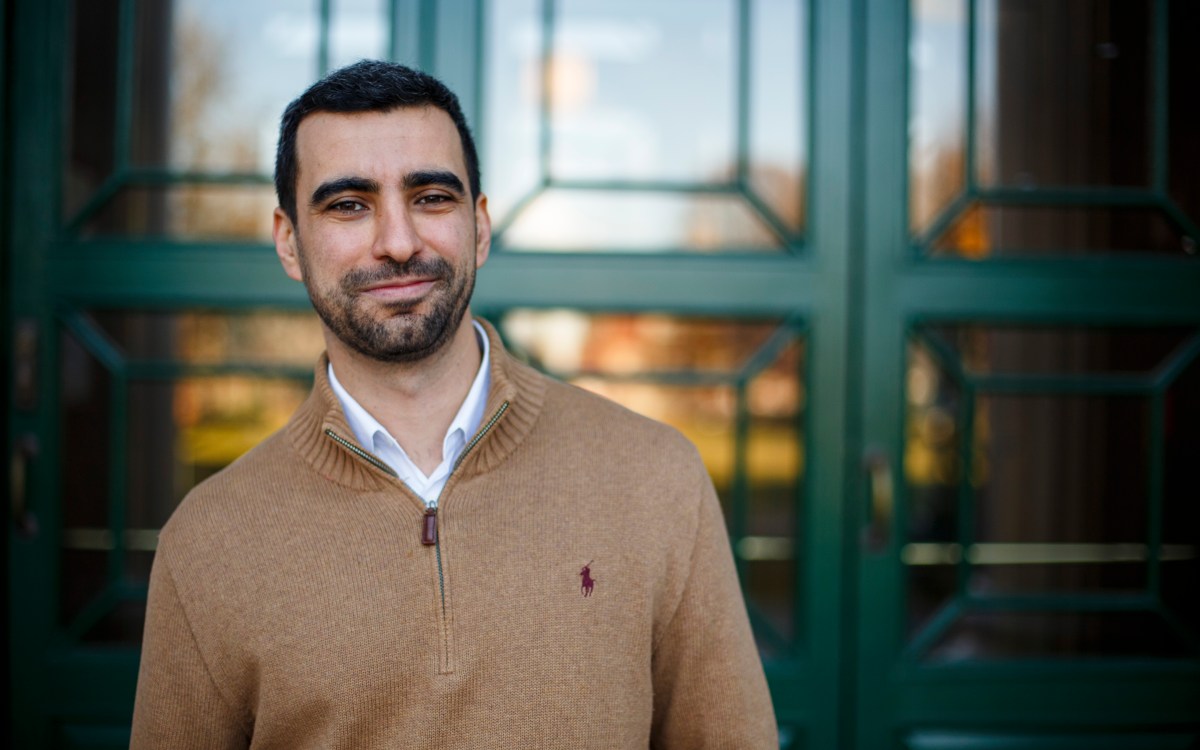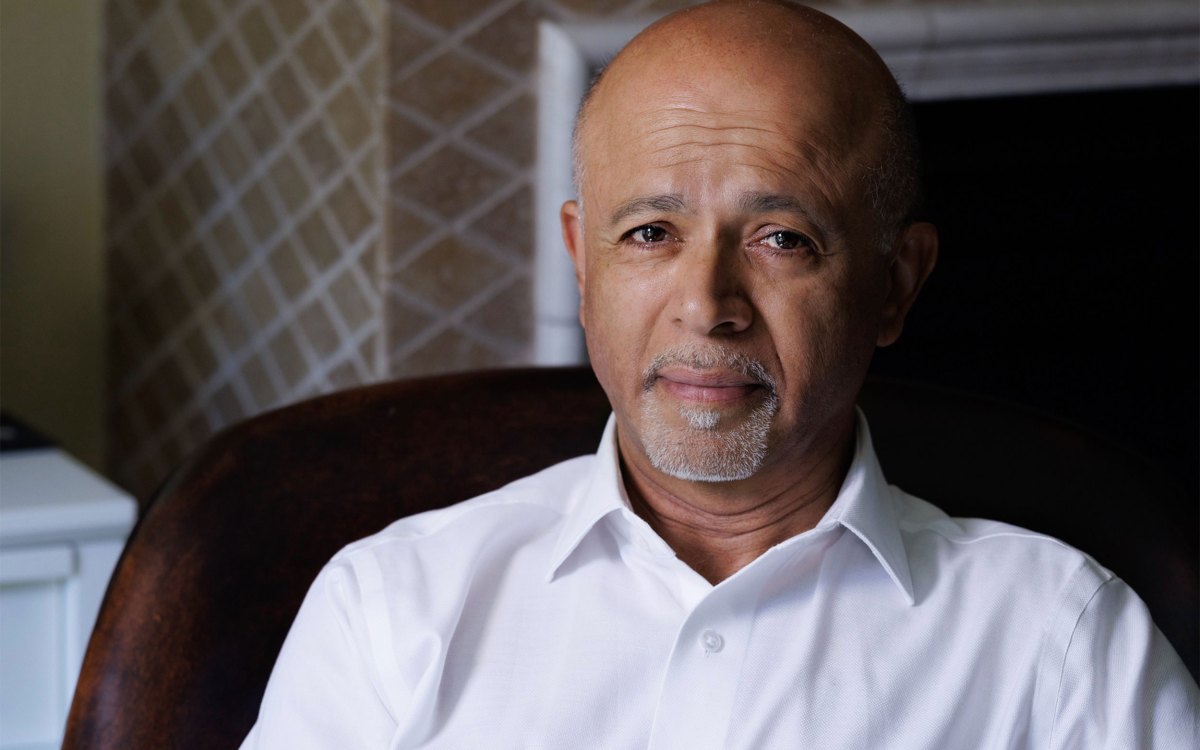Campus & Community
-

5 things we learned this week
How closely have you been following the Gazette? Take our quiz to find out.
-

Donald Lee Fanger, 94
Memorial Minute — Faculty of Arts and Sciences
-

Atul Gawande named featured speaker for Harvard Alumni Day
Acclaimed surgeon, writer, and public health leader will take the stage at Harvard’s global alumni celebration on June 6
-

Sense of isolation, loss amid Gaza war sparks quest to make all feel welcome
Nim Ravid works to end polarization on campus, across multicultural democracies
-

4 things we learned this week
How closely have you been following the Gazette? Take our quiz to find out.
-

Abraham Verghese, physician and bestselling author, named Commencement speaker
Stanford professor whose novels include ‘Covenant of Water’ to deliver principal address May 29
-
Ruby Bridges evokes tears, smiles as she tells her tale
Grownups and children filed quietly into the Memorial Church on April 18, their faces bright with expectation. A group of teenagers with the letters YMCA emblazoned across their sweatshirts looked for a pew where they could sit together as the church quickly filled.
-
HAA has new home
To be more accessible to alumni and to offer improved programs and services, the Harvard Alumni Association has moved. The new address is: University Place, 124 Mt. Auburn St., sixth floor, North Entrance, Cambridge, MA 02138
-
Faculty Council notice for April 24
At its 13th meeting of the year, the Faculty Council discussed possible changes in grading practices and policies in Harvard College with deans Susan Pedersen (history and Undergraduate Education) and Jeffrey Wolcowitz (economics and Undergraduate Education).
-
This month in Harvard history
April 1943 – Signs of the times, as reported by Douglas A. Brown 44 (Harvard Alumni Bulletin): The end of an era came last week on Soldiers Field as the sole surviving representatives of the cavalry and horse-drawn artillery units of the Military Science Department were ridden off by student cadets to an MP detachment in Maynard [Mass.]. As the Army became more and more mechanical, less and less emphasis was placed on the Harvard Regiment, and now the stables along the Parkway are empty. Since [1919,] the year after the Armistice [, . . .] the Army has maintained a string of horses at Soldiers Field for the use of the R.O.T.C. regiment, and in years past the mounts have been used by R.O.T.C. polo teams and various horse-drawn outfits, but polo teams were discontinued last year and intensive class work and drill leave little time for equitation classes and privileged riding.
-
Harvard participates in Cambridge mock disaster exercise
Harvard University officials participated April 24 in a mock disaster exercise organized by the city of Cambridges Local Emergency Planning Committee. The drill involved local, state, and federal response teams, Cambridge Public Health and School Departments, Harvard and Massachusetts Institute of Technology officials, Boston and Somerville representatives, and other health and environmental organizations.
-
Police reports
A complete police report will appear in next weeks Gazette.
-
Shlien to be remembered at Memorial Church
A memorial service will be held for John Shlien, professor of education and counseling psychology emeritus, at the Memorial Church on May 29 at 3 p.m. The service will be followed by a reception in the Eliot-Lyman Room of Longfellow Hall. Shlien died March 23 at his vacation home in Big Sur, Calif. He was 83.
-
It’s the missing data, stupid!
Xiao-Li Meng is a bit different from other scientists. He not only works with the data he has, he works with the data he doesnt have.
-
The Big Picture
Hiking to the far reaches of his classroom and laboratory – 3,000 wooded acres in Petersham – Harvard Forest director David Foster stops to admire a small plot of trees that have been pulled down by researchers to simulate the effect of a hurricane.
-
Community Gifts beats own record
In spite of a sluggish regional and national economy, Harvard employees dug deeper than ever to help those in need, pushing the 2001 – 2002 Community Gifts Through Harvard over its $1 million goal and 12 percent over last years total. In all, Harvard faculty, staff and retirees donated $1,053,756 to charities through one-time donations or regular paycheck withdrawals.
-
ARCO Forum addresses Colombian terror
A four-decade-old civil war and more than a decade of narco-terrorism have left Colombias civil institutions bruised and bloody, seriously undermining Latin Americas oldest democracy. Every 20 minutes a Colombian is killed almost 40,000 Colombians have been killed in the past decade. Approximately 1.6 million of Colombias 40 million people are poverty-stricken refugees who have run away from their villages to escape the violence. The civil war is largely funded by Colombias cocaine production, which is 80 percent of the worlds total.
-
Herchel Smith gives Harvard $100 million
Herchel Smith, a distinguished chemist and philanthropist, recently bequeathed to Harvard new legacies that, when combined with his lifetime generosity, could amount to $100 million over time to support graduate fellowships, new science professorships, and an exchange program for postdoctoral fellows between Harvard and Cambridge universities. The gift, which is among the largest ever received by Harvard, will provide unprecedented funding for the sciences.
-
Mental Health Awareness Week works
I contemplated taking too many pills less than a week after I arrived at Harvard. Depression was tightening its grip on my mind, and I was certain that I was powerless to stop it. In the world according to depression, you did not earn any of the positive things that happen in your life, and the negative events were your fault even before they happened.
-
Bratt is new fellow at Center for Housing Studies
Rachel G. Bratt, a leading expert on the housing and community development sectors, has been named a fellow at Harvards Joint Center for Housing Studies. Bratt is a professor at Tufts University, where she served as a chair of the Department of Urban and Environmental Policy and Planning from 1995 to 2001. She has been on the Tufts faculty since 1976.
-
HBS students review grants for foundation
Giving money away can be every bit as rewarding – and challenging – as making it.
-
Many tiny ‘watches’ keep body’s time
The daily rhythms of the body – once thought to be strictly governed by a master clock lodged in the brain – appear to be driven to a remarkable degree by tiny timepieces pocketed in organs all over the body. Whats more, these peripheral timepieces appear to be strikingly idiosyncratic in appearance – more like Swatch watches than the classic Timex. Clocks located in the liver and heart appear to use very different sets of genes to perform essentially the same functions, researchers at the Medical School (HMS) and the School of Public Health (SPH) report in the April 21 Nature online.
-
Arts First fetes 10 years with 225 events
For the 10th straight year, Harvard will explode with the creative outpouring of students, faculty, and alumni next weekend (May 2 – 5), as Arts First fills the entire campus with a riot of color, sound, and motion.
-
Leakey: Save the Serengeti
In his introductory remarks at a lecture Sunday night (April 21) sponsored by the Museum of Natural History (HMNH) at Sanders Theatre, Mellon Professor of the Sciences and Pellegrino University Professor Emeritus E.O. Wilson called Richard Leakey a heroic figure whose life is an epic. He briefly recounted Leakeys bio: The son of the paleoanthropologists Louis and Mary Leakey, as a young man Leakey switched to the family business – namely discovering fossils in East Africa that illuminate African animal history and the early evolutionary history of the human species. He went on to become director of the National Museums of Kenya and of the Kenya Wildlife Service to lead the ban on the ivory trade to raise $150 million for wildlife conservation and – despite an airplane crash that cost him both his legs but scarcely slowed him down – to be appointed head of Kenyas civil service and secretary of the cabinet.
-
Two are recognized by College
Harvard College has selected Laura E. Clancy 02-03 as the winner of the 2002 Harvard College Womens Leadership Award for her exceptional leadership skills.
-
Finally – a home for cinephiles
Not long ago at the Harvard Film Archive (HFA) more than 20 Harvard community movie hounds showed up for the inaugural meeting of Cinephiles Unite, a new special interest group started by Harvard Neighbors (HN) that connects film lovers from across the University with screenings and movie chat. The featured film on this occasion was an updated adaptation of Hamlet, starring Ethan Hawke, Bill Murray, and Julia Stiles. Although shown in the smaller room B-04, rather than the Carpenter Centers main theater, Hamlet was projected onto a wide screen with state-of-the-art digital video and audio, allowing the audience to appreciate the films frequent use of ambient sound and striking visuals.
-
Chris Lydon to deliver Lowell Lecture
Journalist Christopher Lydon will deliver the annual Lowell Lecture, A Culture Trying to Happen, on Tuesday (May 7) at 8 p.m. in Science Center C. The Lowell Lecture is devoted to explorations of major issues of our time and is jointly sponsored by the Lowell Institute of Boston and the Harvard University Extension School.
-
Pluralism Project to host women of all faiths
The third consultation on womens networks in multireligious America will be held at Harvard University this Saturday (April 27) through Monday (April 29). This consultation builds on two previous conversations hosted by the Pluralism Project, under the direction of Diana Eck, professor of comparative religion and Indian Studies.
-
Losing control
Its one of the first things children learn when they start school – no gum chewing! Dubble Bubble, Chiclets, Dentyne, Wrigleys Spearmint – all verboten! And dont even think about leaving the chewed wad stuck to anything.
-
Antiques from Late Antiquity
If you think globalization is a recent phenomenon, check out the exhibition in the newly renovated Divinity School library, Light From the Age of Augustine: Late Antique Ceramics From North Africa (Tunisia).
-
Summers donates 750 books to four Cambridge elementary schools
“Un libro te lleva al cualquier sitio que tu quieras“: a book takes you wherever you want to go, 9-year-old Gabriel Castro told Harvard President Lawrence H. Summers on Friday…
-
Letting nature do the work
The scientist put what looked like black dust into a dish of water. Instead of dust, however, the particles were actually diodes, capable of emitting light under the right conditions. In the dish sat a cylinder, patterned with tiny dots of solder connected by threadlike lines of solder. The goal of the experiment was to get the tiny electronic devices to land on the solder dots.
-
Gender transcends disciplines
From street vendors in India to fighter pilots in the U.S. Air Force, from teen pregnancy to religious asceticism, issues of gender united academics from around Harvard Friday (April 19) in an unusual cross-disciplinary conference.
-
In brief
Teen conference is set for Arab Americans
-
Cornell kills hope for Crimson crown
For a team that was forced to share last seasons Ivy crown with the Harvard softball squad (thanks to some late-season Harvard heroics), Cornells 5-1 win over the Crimson this past Sunday (April 21) was a fitting bit of redemption for the Big Red. As Cornell drilled five hits in the fifth inning against Harvard in the first contest of the doubleheader, the Big Red simultaneously managed to bury Harvard hopes for another (partial or otherwise) Ivy crown. Likewise, the defeat knocked the hot Crimson team out of contention for a NCAA Tournament spot. Still, posting a strong 10-2 record in the Ivies (26-8 overall), the Crimson managed to secure second place behind the eventual champion Princeton Tigers – way ahead of the remainder of the Ivy pack, including third-place Cornell, who are .500 with two league games remaining.
-
Lights! Camera! Doctors!
Does your doctor sing? Does your dentist tap dance?


